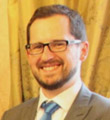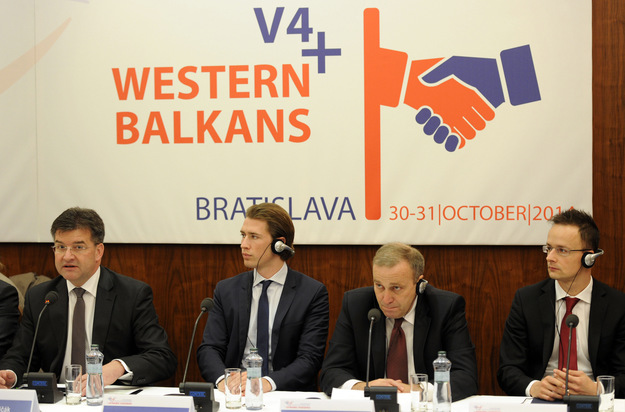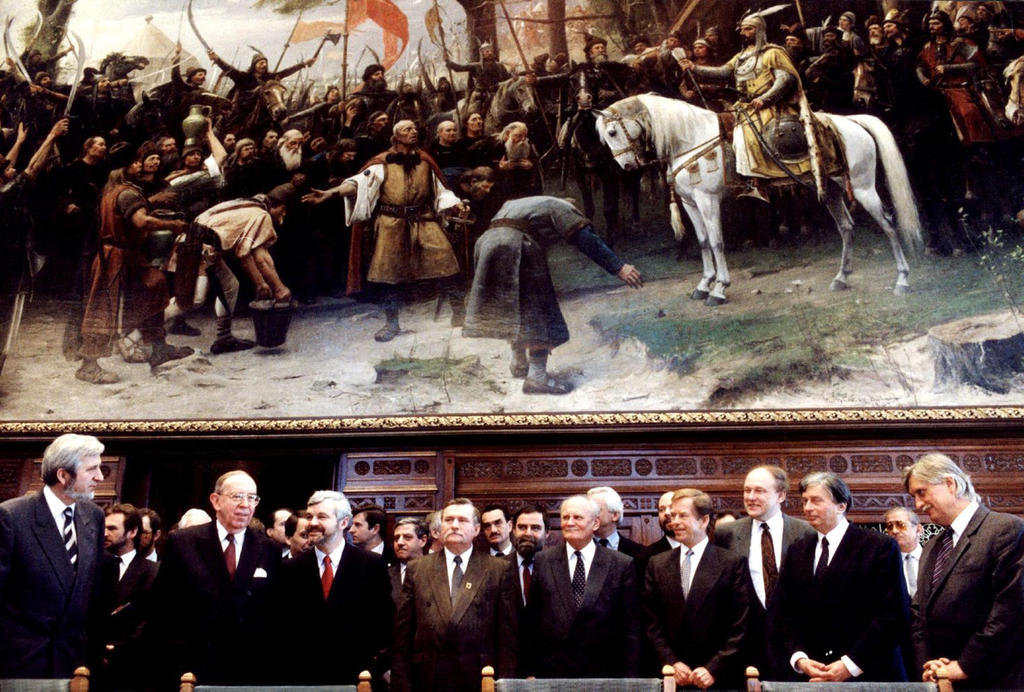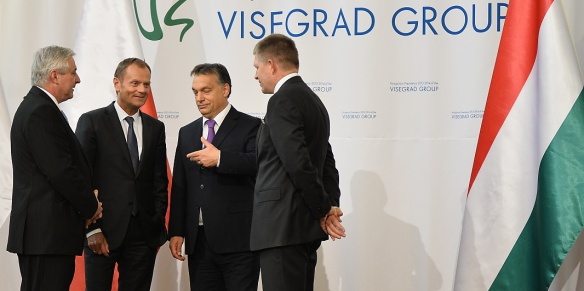 South East Europe could take inspiration from its Central European neighbours and focus on regional cooperation to boost its talks about Euro-Atlantic integration, Jarosław Wiśniewski suggests. 26 years after the region ‘returned to Europe’ following the first partially free elections in Poland, he outlines five key lessons for the Balkans.
South East Europe could take inspiration from its Central European neighbours and focus on regional cooperation to boost its talks about Euro-Atlantic integration, Jarosław Wiśniewski suggests. 26 years after the region ‘returned to Europe’ following the first partially free elections in Poland, he outlines five key lessons for the Balkans.

The Visegrad Group (V4), born in early 1991 as an alliance comprising Czechoslovakia (later dissolved into the Czech Republic and Slovakia) Hungary and Poland, had three main priorities: advancing democratic state-building, joining the European Union, and joining NATO. Lessons learned from the model of V4 cooperation can be an example of pragmatic cooperation for South East European countries in their quest for Euro-Atlantic integration.
There are some signs of political will in this direction coming from the Western Balkans: ‘We have agreed to ask the president of the European Council Mr Donald Tusk to organize a summit for leaders of the EU and South East Europe, where we will finally convince the EU that enlargement is not only a technical question, but a political issue; that it affects the future of all of our citizens’, declared the Serbian President Tomislav Nikolic during a recent SEE summit in Budva, Montenegro.
Similar ideas were floated in the past, e.g. at the 2011 Montenegro G6 meeting, but have been dismissed by many as attempts to re-create Yugoslavia. This clichéd understanding of the current political situation in the Western Balkans is plainly wrong: in the quest for European enlargement, SEE countries are not competitors, but natural partners. They are on the same side and cooperation should be the preferred option.
Visegrad Group’s history
The Visegrad Group traces its history back to 1335 and the castle in the Hungarian town of Visegrad, where Czech, Polish and Hungarian kings met to discuss political and commercial cooperation. Apart from establishing the alliance, the main reason why the kings gathered in Visegrad was to settle the dispute over Polish territories seized by the Teutonic Knights.
Following the start of the democratic transition in 1989, Visegrad became the natural place for the leaders of the three neighbouring countries to meet and discuss their next steps in the process of ‘return to Europe’.
More than 650 years later, on the 15th of February 1991, it is there that Vaclav Havel of Czechoslovakia, Jozsef Antall of Hungary and Lech Wałęsa of Poland decided to strengthen cooperation between Budapest, Prague and Warsaw.

The reasons were pragmatic. The impending fall of the Soviet Union (December 1991), of the Council for Mutual Assistance (June 1991), and of the Warsaw Pact (July 1991) led to a political, economic and security vacuum in the centre of the European continent. The Visegrad concept of cooperation was therefore an attempt to formalize consultations between the closest neighbours by creating an informal forum for discussion. It also served as a place for the continuation of the dialogue among former dissidents (e.g. between the Polish Solidarity movement and the Czechoslovak Charter 77).
Even though the group has now arguably achieved its original priorities (namely: democratisation and Euro-Atlantic integration), its work still continues as a sui-generis alliance of four EU Member States. Its achievements, as well as shortcomings, should be a valuable study.
[jwplayer mediaid=”2060″]
VIDEO: Bronisław Gemerek, Poland’s former foreign minister and chief negotiator for EU accession, recalls his joy on May 1, 2004, when the country joined the European Union.
So, what are the key lessons learned?
1. Be pragmatic
The Visegrad Group is far from being a perfect alliance, composed as it is of very diverse countries.
It is easy to point at differences, especially when it comes to foreign policy: Hungary is keen to maintain close ties with Austria, while Slovakia is less so; Hungary and Slovakia have a greater energy dependence on Russian gas than Poland, impacting on their relationship with the Kremlin; Poland is keen to be sitting at the EU’s main table, while the other three are more interested in pursuing their own country-specific interests. Differences in terms of sizes and types of economies are marked as well, Poland being more focused on domestic market, while the rest of the V4 is more export-oriented.
Although signs of disagreement will sometimes be made public (e.g. see the ‘difficult talks’ between the Polish and the Hungarian PMs in February 2015), such spats have not so far ruled out cooperation in other sectors. The V4 has proved to be a reliable forum for regional discussions and debates, where difficult political and historical issues have been settled.
2. One for all, and all for one
All countries undergoing delayed transition suffer from some shortages: but it is key to remain loyal to your closest partners and work on common solutions together.
At the end of the 1990s it seemed that the path towards Euro-Atlantic integration was becoming realistic for all V4 countries except for Slovakia, which was being left out of the picture. This was a direct result of the policies of Vladimir Meciar’s government in Slovakia from 1994 to 1998 (politicisation of state-run companies, media outlets and universities, and a debatable privatisation process – to mention only the most salient criticisms). They have slowed down of the Euro-Atlantic integration perspectives for Slovakia and increased tensions between Bratislava, Budapest and Prague.
This situation has drastically changed with the new government of Mikulas Dzurinda, which took office at the end of October 1998. The unequivocal support of the prime ministers of the remaining three countries in October 1998, and their declaration to revitalize the Visegrad Group also included a pledge of support for Slovakia, leading to increased quadrilateral cooperation from 1999 onwards. The decision to include Slovakia was also deeply pragmatic for security reasons (e.g. due to the shared borders).
Similarly, the current crisis in Macedonia is not only an issue of domestic Macedonian politics, nor is it something that can be solved through Brussels-Skopje dialogue alone. It is also a matter or regional stability. Taking into account the history of the region and of its inter-ethnic relations, any outside involvement in the situation in Macedonia could be perceived negatively. Once the current crisis in Macedonia is resolved (and the direct involvement of the EU’s Enlargement Commissioner Johannes Hahn gives hope that it might be soon) Skopje will need much regional support in order to catch up with EU negotiations to match Montenegro’s and Serbia’s progress. Furthermore, recent EU members from the region should not turn their backs on their neighbours who are still at the EU’s doorsteps.
3. Talk to each other
Regular consultations (rotational presidency, high-level summits, frequent meetings at lower levels of administration etc.) create invaluable lines of communication among all four countries. Regular cross-level consultations provide an ‘early-warning system’ which allows to avoid surprises and helps to calm down incipient crises that risk of getting out of hand.

Communication should not, however, be limited to crisis situations – as was the dialogue initiated in the aftermath of the events in Kumanovo. There needs to be full regional support for integration, encouraging signs of which are already visible, for instance, in Croatia, whose authorities are supporting Montenegro with the translation of documents necessary for negotiations with the EU. Additionally, the Western Balkans have a number of great advantages, including a language shared by most of the countries (with the exclusion of Albania) and media with regional reach (e.g. Al Jazeera Balkans).
4. Build a positive narrative
The Western Balkans desperately need a positive narrative. The negative connotations of ‘Balkanization’, the images from the wars of the 1990s, the news reports about mass demonstrations and protests, the exodus of citizens from Kosovo (now ranking third on the list of countries of origin of non-EU asylum seekers in the EU 28 Member States) only add to its negative image.
Common summits and meetings on various levels are a first step. Opportunities for discussion tend to be increasingly frequent in the Balkans: the seaside town of Budva, in Montenegro, has become a regional hotspot in the early June of 2015: first hosting a major security-oriented forum To Be Secure, and then a Brdo-Brioni summit. This is still insufficient and should be followed by an increased cooperation at grassroot level, paying special attention to involving young people. Building a positive narrative, however, is impossible without necessary cohesion funds.
5. Invest in your society
The International Visegrad Fund (IVF), launched in 2000, aims at strengthening civic initiatives and supporting non-governmental organisations from all four countries. It provides them with grants for projects focusing on culture or education, supports youth exchanges, trans-border cooperation and the promotion of tourism. Its annual budget (approximately 5 million Euros) cannot be compared to similar European funds, but its focus is primarily regional. It provides opportunities for citizens of all four countries to understand each other better, to address stereotypes and to promote the countries’ cultural heritage (through initiatives such as the Meteorit International Arts Festival or 18 strings of V4 countries).
A Youth Centre for Albanian–Serbian relations, which was proposed during last year’s Berlin Summit and then announced again by the Albanian FM Ditmir Bushati during his speech at LSE last November, would be a step in a similar direction. Inclusion of other countries from the region, in particular Macedonia and Montenegro (and Kosovo, though this may prove politically difficult for Belgrade) and an increased focus on young people, could help tackle negative stereotypes, which are often further strengthened by partisan media in each of these countries.
The IVF is only one example of how a relatively small budget can be used for educational and cultural initiatives. In the end, public support for any enlargement is in the best interest of politicians. Talking only about economic benefits may not be sufficient, especially when we can look at the case of Croatia and its relative stagnation after joining the EU. There is a need for a positive narrative about benefits stemming from European integration looking beyond merely financial indicators.
An opportunity for the V4 to show leadership in foreign policy
There is a lot that could be done by the V4 to highlight its accomplishments and its synergies with the SEE countries. Year 2016 may have particular significance due to two major events: the NATO Summit in Warsaw and Slovak presidency of the Council of the European Union.
There is hope that NATO enlargement will be on the agenda of next year’s Warsaw Summit. As the history of the previous summits has shown, the hosting country has a sizeable influence on the summit’s agenda. The recent announcement, by the head of the Polish Ministry of Defence in Wroclaw, that Montenegro and Macedonia should be invited to NATO during its next summit sends a very positive signal.
What is even more important for the region – EU enlargement – could be raised by the Slovakian presidency. Recent events in the region seem to be offering some hope. Bosnia and Herzegovina hopes that the new British – German initiative (adopted by the EU) will finally lead to an exit from the stalemate. The current crisis may also prove to be a turning point for Macedonia. The future of Serbia’s EU aspirations may depend on the dialogue with Kosovo.
What is still missing is investment in young people. The V4 could use its funds to offer scholarship opportunities for young people from the Western Balkans to study in Central Europe. Small-scale projects are already taking place (e.g. language summer schools in Poland), but a more coordinated approach, taking advantage of prestigious regional universities in Budapest, Prague or Kraków, should potentially attract many young people.
Brussels seems to be occupied with the perspectives of Grexit and Brexit more than with the prospect of further stabilisation in the Western Balkans. Conversely, this should be one of the key areas of interest for the Visegrad Group, which could show some real leadership in the area of foreign policy, just as Germany and other ‘old’ member states did prior to the 2004 accession, and build its credentials for further actions in the Eastern Partnership countries. There are incipient signs of such cooperation, such as the V4’s visibility during a recent security forum in Montenegro, but the synergies need to be strengthened. Deeper cooperation in the V4+ format, between the Visegrad Group and South East European countries, would be clearly beneficial for all sides.
Note: This article gives the views of the authors, and not the position of LSEE Research on SEE, nor of the London School of Economics.
_____________________
Dr Jarosław Wiśniewski is an academic and political analyst who specializes in international security and European politics. He holds a PhD in European Studies from King’s College London, as well as master’s degrees from University College London and the University of Wrocław, Poland. Throughout his career, he has worked as a consultant for the European Commission, Council of Europe, British Council as well as a number of European civil society organizations and various public and private institutions in the EU and in South East Europe: in Albania, Kosovo, Macedonia, and Serbia among others. He tweets @jarwisniewski.


